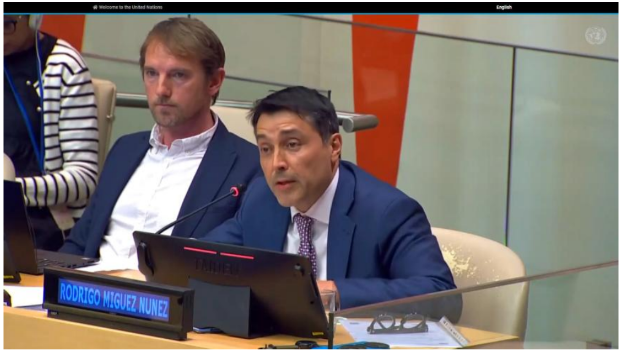Speak4Nature contributed to the international dialogue sponsored by the UN General Assembly on Mother Earth Day
On April 24, 2023, Professor Rodrigo Míguez Núñez (DISSTE), who is the lead investigator of the international project Speak4Nature, spoke at the United Nations headquarters in New York during the “Twelfth Interactive Dialogue to Commemorate International Mother Earth Day”

On Monday, April 24, 2023, Professor Rodrigo Míguez Núñez (DISSTE), principal investigator of the international project Speak4Nature, led by the University of Eastern Piedmont, intervened at the United Nations headquarters in New York during the twelfth “Interactive Dialogue to Commemorate International Mother Earth Day”.
Speak4Nature aims to enhance and promote the study, exchange, and dissemination of knowledge on issues related to “ecological justice” and “ecology of law”, contributing to the improvement of standards and policies on climate justice. Below is the full intervention of Professor Míguez Núñez.
Distinguished Madame Moderator, Distinguished delegates, Dear Ladies and Gentlemen, I’d like to express my gratitude for this honorable invitation and use this extraordinary opportunity to briefly comment on the work that I’m doing with the collaboration of my colleagues in academia and the support from the European Union. I’m professor of private law at the University of Eastern Piedmont in Italy, and I represent a consortium of nine forefront academic and non-academic institutions based in Europe and Latin America that is currently implementing the project entitled: “Speak 4 Nature: Interdisciplinary approaches on ecological justice”. The project has been funded for the years 2023 2027 by the European Commission, and its specific object is to transfer knowledge on the topic of “ecological justice”, an alternative paradigm of legal theory where nature is no longer simply “a factor” of justice but an actor that “receives” it. The existence itself of our project is a sign of the growing interest in fostering research into legal cosmologies that are alternatives to the hegemonic model that treats nature as a mere object of human needs. In this regard, the European Union is putting in place a number of strategic instruments aimed at recognizing the interdependence of human and non-human nature and the equivalence of their values. One example of this effort is the European Union Biodiversity Strategy for 2030, which is framed in a holistic vision of the Sustainable Development Goals. Another one is the 8th
Environment Action Programme, which reiterates the European Union’s vision of living well, but within planetary boundaries. These are just a few examples of the actions that are being carried out in Europe to promote new epistemologies in line with the perspective that the United Nations is supporting through this interactive dialog. The Earth-centric approach that brings us together today needs a clear universal language. It is about acting “as one”, but with the caveat that the universal emerges from the plurality of ways of understanding our relationship with the Earth-system. Speak4Nature’s project recognizes that plurality. Our purpose is to build a common theoretical and empirical language, based on collaboration and openness towards cultural and political diversity, to improve the eco-centric dialogue between the social and environmental sciences and between sciences and civil society. I have taken the time to briefly explain our project because I believe that this is a precious opportunity to generate synergy with the work that the United Nations develop within the Harmony with Nature program and the upcoming Earth Assembly.
If we need to act now and as one, I would like to conclude by putting at the disposal of this Assembly, and of the Earth Assembly process, the knowledge and resources of the consortium I represent to strengthen the scientific basis of our common cause: the guardianship of and the justice for the Earth we inhabit.
I thank you for your attention.
